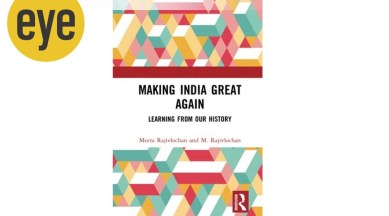What We Lack: Meeta and Rajivlochan’s book Making India Great Again chooses action over nostalgia
A thought-provoking effort to critically engage with our history with the purpose of creating a road map for the future

Making India Great Again as a title does suggest that the work aims to give prescriptions on how a long past golden age can be reconfigured. That, however, is not the intention of the Rajivlochans. Their aim is to closely scrutinise some aspects of our history and extract from it a list of deficiencies as action points to be addressed and fixed as India looks to the future. Finding “lessons” from history is, of course, treading on a slippery path but within the methodological limits posed by this caveat, their book is a thought-provoking effort to critically engage with our history with a view to our present predicaments. The latter, in particular, can be summarised as simply that while we have made some good progress and have substantial achievements to our credit, our performance remains under potential and others have done better.
In precolonial times, India had developed a certain dexterity in establishing complex financial institutions; it had substantial achievements in mathematics, as well as a level of technology which demonstrated that it was second to none in the world in these and related skill sets. And yet, colonial conquest, economic exploitation and degradation followed at the hands of external powers that were smaller, weaker and in many ways less developed. Why did this happen? The answer that the book develops has different dimensions but each emerges from one central impulse: “A certain inability to systematise information”. The authors explain at the outset “whether it is taxation, fighting battles or doing business and making money, it is a superior quality of information that would decide who might win and who finally loses. The Indian encounter with the English East India Company in the 17th and 18th centuries is important in that it shows both missing pieces. It is not superior technology, nor a greater access to capital that gave the Company decisive advantage over local rulers and merchants. These advantages were generated by superior record keeping, a high quality of information for better decision making and the knowledge that trading produces more profit when protected by the authority of the state.”
monthly limit of free stories.
with an Express account.
These thesis is fleshed out with some examples from our history: the House of Jagat Seth in eastern India; the making of high quality steel that had a high reputation internationally till well into colonial times, and, the great achievements in mathematics, but no comparable achievement in other sciences or in marrying science to practical knowledge to advance and scale up technology. In each of these varied fields, the authors point out the common thread running through is the absence of systems for systematising information and experience to establish a knowledge pool which could be transmitted, replicated and scaled up. Thus, in India while “knowledge was important, knowledge systems remained distant”. India fell behind, in other words, because Indians were deficient in collecting, organising and passing on knowledge to create ever expanding “systematic networks of information and trust”. In contrast, Europe “forged ahead to use its collective knowledge, accumulated over generations, to bring in industrialisation and associated efficiencies, reduction in the cost of production and enlargement of the scale of society.” Thus, India remained as it was while the world around it changed.
Why didn’t Indians change when they saw Europeans doing things differently? At times, the authors suggest that existing endowments in terms of rich natural resources were so plentiful that there was little incentive to change. More convincing is the argument that “Indian society found it difficult to generate means, whether formal or informal, of exchanging information across groups.” These deficiencies also had a direct impact on political and military power. The Marathas lost to the English not because they lacked superior firepower or were deficient in numbers but because the English, Scottish and Eurasian officers they relied upon were not going to fight against the English. But “no Maratha chief had ever cared to set up any institution for formal training of their officers” and, thus, the larger failure was the inability to understand the value of knowledge systems.
This, the book argues further, is by no means restricted to the story of India’s past. If India is to become a wealthy nation we need to, it says, “build a learning society” which means “a society that is self-reflexive; that constantly takes feedback” and “We should stop looking for feel good arguments which only see India as a victim”. These are conclusions difficult to disagree with and the book is a serious effort to understand and explain our sub optimal performance in different fields.
TCA Raghavan is a former diplomat. His latest book is History Men: Jadunath Sarkar, G S Sardesai, Raghubir Sinh and Their Quest for India’s Past (2020)